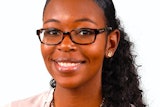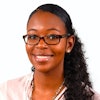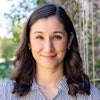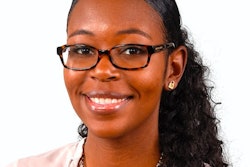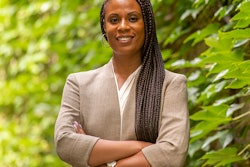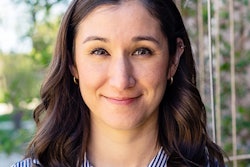Title: Assistant Professor, Department of Fisheries, Animal, and Veterinary Sciences, University of Rhode Island
Tenured: No
Age: 36
Education: B.A., international affairs, University of Nevada, Reno; M.S., geography and environmental resources, Southern Illinois University-Carbondale; and Ph.D., geography, Oregon State University
Career mentors: Dr. Leslie Duram, Southern Illinois University-Carbondale; Dr. Larry Becker, Oregon State University; Dr. Joan Gross, Oregon State University; Dr. Shireen Hyrapiet, Houston Community College; Dr. Amelia Moore, University of Rhode Island; Dr. Kendall Moore, University of Rhode Island; Dr. Irene Mata, Wellesley College; and Dr. M. Gabriela Torres, Wheaton College
Words of wisdom/advice for new faculty members: “Community is everything! Find your people, learn how to support them, and let them support you when you need it too.”
Human interaction is at the center of Dr. Melva Treviño Peña’s work. At The University of Rhode Island’s (URI) Department of Fisheries, Animal and Veterinary Sciences, much of Treviño Peña’s scholarship involves listening to and studying people.
Treviño Peña, an assistant professor in the department, describes herself as a human geographer, ethnographer, and social scientist. The junior scholar’s research examines various changes in the environment and how they affect people — the intersection of human and natural relationships.
“What I’m really interested in is people’s experiences with the environment, particularly environmental change, and documenting how they navigate these changes,” Treviño Peña says. “I’m especially interested in how different groups of people experience the environment and environmental change. So, in general, I just like to study how different aspects of people’s identities impact their ability to navigate nature.”
Treviño Peña’s work ranges from the coasts of Rhode Island, where she studied how people from marginalized groups navigate coastal access, to South America, where she studied how mangrove deforestation impacted people of different genders in Ecuador. She pays close attention to the nuances in the communities she studies, aware of how different people and subgroups may be affected differently by environmental change depending on characteristics such as gender, age, parenthood, and cultural background. “Even within that [community in Ecuador], women’s experiences were different than men’s with the loss of access to mangrove forests,” she says. “And the age of the woman might really dictate how they felt that these changes impacted them or whether the women have children. Are they young children? Are they older children? So, you start to break apart different groups of people based on particular characteristics of who they are.”
Much of the current language and strategy around protecting the environment from environmental and climate change has to do with preserving economic resources, with decisions made top-down, according to Treviño Peña. It’s a process that could prove ineffectual or even harmful for those facing the brunt of these changes.
“I feel like oftentimes the people who live in places, the frontline communities, the ones that are actually living the burdens of these changes firsthand, their perspectives are not always fully represented in the decision-making process,” she says. “Their values and their needs are not really, fully being accounted for.”
Treviño Peña says, when decisions are made without knowing or understanding how different people are already experiencing the changes they’re facing, such as climate change, “then the decisions that we make may or may not actually support their needs. It could even — worst case scenario — actually pose even more detrimental impacts on them.”
Treviño Peña has been a proud community builder. From professional learning communities to friend groups to mentoring programs for faculty of color, she consistently looks to engage in and create formal and informal communities for people.
“I’m seeking those spaces for myself. They don’t exist, and I help make them,” Treviño Peña says. “But by me doing that, other people get to also be a part of them and benefit with me. I think it’s been the reason that I’ve been able to survive and to be here. It’s because of those communities, those very intentional and deeply nurturing communities that I’ve been able to make. I’ve always been just building them as I build myself up as a scholar.”
Treviño Peña’s colleagues describe her as inspiring, confidence-giving, passionate in her work, and generous with her time.She provides people with places to voice their concerns and feel comfortable, says Dr. Marta Gomez-Chiarri, a professor who works in the same department as Treviño Peña. Her commitment to service, to listening to and working with local communities is also impressive, says Dr. Amelia Moore, associate professor in URI’s Department of Marine Affairs.
“Melva is the kind of person who does a ton of service,” says Aura Fajardo Grandidge, interim assistant dean at URI. “The traditional tenure and promotion processes do not recognize or value service to the same level as research and grant funding. I want her to be recognized for this work, because the effect that she’s having on tons of individual students at this institution is priceless.”
